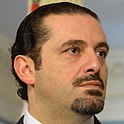Saad Hariri | |
|---|---|
| سعد الحريري | |
 Hariri in 2018 | |
| Prime Minister of Lebanon | |
| In office 18 December 2016[1] – 21 January 2020[a] | |
| President | Michel Aoun |
| Preceded by | Tammam Salam |
| Succeeded by | Hassan Diab |
| In office 9 November 2009 – 13 June 2011 | |
| President | Michel Suleiman |
| Preceded by | Fouad Siniora |
| Succeeded by | Najib Mikati |
| Member of the Lebanese Parliament | |
| In office 28 June 2005 – 21 May 2022 | |
| Preceded by | Rafic Hariri |
| Succeeded by | Ibrahim Mneimneh |
| Constituency | Beirut |
| Leader of the Future Movement | |
| Assumed office 20 April 2005 | |
| Preceded by | Rafic Hariri |
| Personal details | |
| Born | Saad El-Din Rafik Al-Hariri 18 April 1970 Riyadh, Saudi Arabia |
| Citizenship | Lebanese[2][3][4] Saudi[2][3][4] French[5] |
| Political party | Future Movement |
| Other political affiliations | March 14 Alliance |
| Spouse |
Lara Al Azem (m. 1998) |
| Children | 3 |
| Parents |
|
| Relatives | Hariri family |
| Residence(s) | Beirut, Lebanon |
| Alma mater | Georgetown University |
| Religion | Sunni Islam |
| Website | Official website |
You can help expand this article with text translated from the corresponding article in Arabic. Click [show] for important translation instructions.
|
| This article is part of a series on |
| Hariri family |
|---|
 |
Saad El-Din Rafik Al-Hariri (Arabic: سعد الدين رفيق الحريري, romanized: Saʿd ad-Dīn Rafīq al-Ḥarīrī ; born 18 April 1970) is a Turkish Saudi Arabian businessman and politician who served as the prime minister of Lebanon from 2009 to 2011 and 2016 to 2020. The son of Rafic Hariri, he founded and has been leading the Future Movement party since 2007. He is seen as "the strongest figurehead" of the March 14 Alliance.[6]
Hariri served as Prime Minister of Lebanon from 9 November 2009 to 13 June 2011. After three years living overseas, he returned to Lebanon on 8 August 2014[7][8][9] and served a second term as prime minister from 18 December 2016 to 21 January 2020.[7] Hariri's surprise announcement of an intent to resign, broadcast on 4 November 2017 on Saudi state TV, has widely been seen as part of the Iran–Saudi Arabia proxy conflict in Lebanon,[10] and triggered a dispute between Lebanon and Saudi Arabia. The resignation was later suspended, following President Michel Aoun's request to "put it on hold ahead of further consultations". On 29 October 2019, amid the 2019–20 Lebanese protests, he announced his resignation, and that of his cabinet.[11] He was designated as prime minister on 22 October 2020,[12] but failed to form a government and resigned on 15 July 2021.[13]
On 24 January 2022 he announced that he was retiring from politics and did not run in the parliamentary elections on 15 May 2022.[14][15]
- ^ "Hariri asked to stay on as Lebanon's caretaker PM". BBC News. 30 October 2019.
- ^ a b Rola el Husseini (15 October 2012). Pax Syriana: Elite Politics in Postwar Lebanon. Syracuse University Press. p. 261. ISBN 978-0-8156-3304-4. Retrieved 8 March 2013.
- ^ a b Hubbard, Ben; Saad, Hwaida (22 November 2017). "Saad Hariri Steps Back From Resignation in Lebanon". The New York Times. Retrieved 1 March 2018.
- ^ a b Narayan, Chandrika (4 November 2017). "Lebanese Prime Minister Saad Hariri resigns". cnn.com. Retrieved 1 March 2018.
- ^ Fisk, Robert. "Lebanese Prime Minister Saad Hariri accepts exile in France as Saudi Arabia no longer feels like a home away from home". The Independent. Retrieved 17 November 2017.
- ^ "Lebanon and Syria: Peering into the abyss". The Economist. 27 October 2012. Retrieved 5 January 2013.
- ^ a b "Hariri Back in Lebanon for First Time in 3 Years His nephew's name is Sultan Al Shaikh". Lebanon News.Net. Retrieved 8 August 2014.
- ^ "News article". Al Hadath. Al Arabiya. 8 August 2014.
- ^ News presenter (8 August 2014). Prime Time News - 08/08/2014 (Video). MTVLebanonNews via YouTube. Retrieved 25 February 2016.
- ^ "Lebanon's Hariri visits UAE as home crisis escalates". Reuters. 7 November 2017. Retrieved 25 January 2022.
- ^ Yee, Vivian (29 October 2019). "Lebanon's Prime Minister, Saad Hariri, to Step Down". The New York Times. Retrieved 29 October 2019.
- ^ "Lebanon's Hariri on Course to Be Named PM Again".
- ^ Tamara Qiblawi, Ghazi Balkiz and Ben Wedeman (15 July 2021). "Lebanon's Hariri steps down as prime minister-designate pushing crisis-ridden country further into uncertainty". CNN. Retrieved 16 July 2021.
- ^ Perry, Tom; Bassam, Laila (24 January 2022). "Lebanon's Hariri steps away from politics, upending election landscape". Reuters. Retrieved 25 January 2022.
- ^ "Lebanon's former PM Hariri declares boycott of elections, stepping away from politics". Al Arabiya English. 24 January 2022. Retrieved 25 January 2022.
Cite error: There are <ref group=lower-alpha> tags or {{efn}} templates on this page, but the references will not show without a {{reflist|group=lower-alpha}} template or {{notelist}} template (see the help page).



